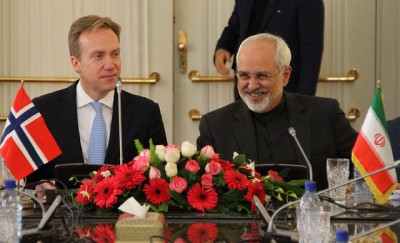A “substantial and constructive discussion” last week with Iran’s foreign minister still hasn’t led to any decision on whether Norway will join a US-led effort to send military patrols to the Strait of Hormuz. Norway’s own foreign minister, Ine Eriksen Søreide, stressed the importance, meanwhile, of “maintaining a close dialogue during difficult times.”

As opponents of the “bloodthirsty” regime in Iran demonstrated outdoors and in front of the Norwegian Parliament, and bashed the Norwegian government for receiving Iran’s Javad Zarif, he and Søreide smiled and offered an assessment of their “discussion” that covered bilateral, regional and international issues “including human rights,” according to Søreide.
She told reporters at a press conference afterwards that she appreciated the opportunity “to discuss sensitive and difficult issues with my Iranian colleague.” Topics included her concerns about the recent escalation of tensions in the region, “particularly in the Persian Gulf, the Strait of Hormuz and beyond.” She stressed that “as a major shipping nation directly affected by acts of sabotage against commercial shipping, Norway has a vital interest in maritime security in and around the Strait of Hormuz.”
While repeating “our consistent message to all involved parties to de-escalate the situation,” Søreide also said she “stressed the importance of avoiding actions and statements that could increase tensions.” Norway has hesitated to respond to the US’ call for participation in its efforts to boost security in the waters off Iran.
Zarif made it clear that any participation in a US military patrol would do exactly that: provoke the Iranians and further heighten tensions. “You can’t expect that we’ll sit still when someone comes to our borders to threaten us,” Zarif said. He told news bureau NTB that history shows how “foreign military presence in the Persian Gulf makes it less safe and secure, and leads to increased tensions.”
Warned against Norwegian participation at Hormuz
Zarif, who also met with Prime Minister Erna Solberg and Trade Minister Torbjørn Røe Isaksen, warned against Norwegian military participation at or around Hormuz, and repeated that message during a session at the Norwegian foreign policy institute NUPI.
“We don’t make threats against others and we will never accept threats against us,” Zarif said. “My advice is that better means of approach can be found, much much better means.” He blamed the escalation of tensions in the area on the US, not Iran, referring to US President Donald Trump as a bully who won’t back off until someone stops him.
Zarif, who also showed up at the G7 meeting in France over the weekend, visited Norway at the end of what Søreide called “a Nordic tour” that included stops in Helsinki and Stockholm. He insisted that Iran is not asking Norway to take sides or “choose between Iran and the US … I know the answer to that, you’ll choose the US.” According to newspaper Dagens Næringsliv (DN), Zarif was “simply asking” Norway to decide on its own future.
“The US is asking you to misuse international law,” he said. “What will be next?”

Søreide, meanwhile, said Norway remains committed to supporting efforts to preserve the nuclear agreement stuck several ago and in which Norway was involved in negotiations. She said she repeated Norway’s “regret” over how Trump has withdrawn the US from the agreement and Trump’s unilateral decision to reimpose sanctions against Iran. Norway supports efforts by France, the UK, Germany and the EU to safeguard the agreement, calling it “important for regional stability and our common security.”
She claimed the two also had a “constructive discussion” on human rights, during which she stressed Norway’s opposition to the death penalty in all circumstances. “I also expressed concerns about the situation for human rights defenders and raised issues related to freedom of religion or belief, freedom of expression and the right to political activity.”
Therese Sollien, a commentator in newspaper Aftenposten, noted how it was difficult to reconcile Zarif’s “mild face,” easy command of English and even laughter” with the brutal regime he represents. She wrote that it was “completely impossible” not to be charmed by the 59-year-old Iranian from a wealthy family who studied in San Francisco as a teenager and eventually acquired both a master’s degree and a doctorate.
He remains a clever diplomat, Sollien noted, so clever “that you can almost forget that he represents a regime that hangs people from cranes for being homosexual or drinking alcohol. Iran is not an ally, the USA is, but with Trump in the White House, and Zarif visiting the Norwegian house, that’s easy to forget.”
newsinenglish.no/Nina Berglund

